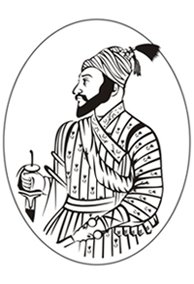Shivaji had won the hearts of one and all at Agra by his courage, dignified bearing, manliness and the principles and values which he symbolized and tried his best to uphold. One of the senior most officer of the Amber (later Jaipur) State who had immense curiosity about Shivaji at Agra as to how he looked like, in what manner he had come to Agra etc. etc., was Kalyandas, the Prime-Minister or Diwan of the State, who found in his own junior official Parkaldas, posted at Agra with Kunwar Ram Singh, a keen observer and a gifted narrator with fondness to describe in minute detail everything relevant to Shivaji's Agra visit (11th May – 18th August 1666). The result is a couple of remarkably informative letters in Rajasthani, like of which are not found in any other language, including Marathi, so far as Shivaji's visit to Agra is concerned.
In his letter of Shravan Vadi 12, S. 1723 (18 July 1666), Parkaldas narrated to his master the conversation between the Amber thakurs (feudal chiefs of Amber).
"One day, when Ballu Shahji, Tej Singhji and Ran Singhji were sitting together, Maha Singh Shekhawat said:
"Shivaji is very wise, he speaks the right word, after which no one need say anything more on the subject. He is a genuine Rajput and we have found him just what we had heard about him. He tells us such appropriate things marked by characteristic qualities of a Rajput that if they are kept in mind, they will prove useful someday". Then addressing Tej Singhji, Maha Singh said "It is sheer destiny that has brought him (Shivaji) here, but when there were a number of good men of high rank like you with the Maharaja, why did you not speak to him (against sending Shivaji to Agra). You should have reasoned and dissuaded the Maharaja". Upon this Tej Singhji said "The Maharaja listens to only one man, his Secretary, Uderaj ….."
Note :
1. Uderaj, the author of the letter-book "Haft Anjuman", and Secretary of Mirza Raja Jai Singh, turned a Musalman after the death of the Maharaja, whom he was suspected to have poisoned, to save himself from the anger of the Rajputs.
2. The aboe letter shows that Uderaj had played an important part in convincing his master Mirza Raja Jai Singh, the desirability of Shivaji's visit to Agra. Was he one of the conspirators to contrive Shivaji's visit to Agra so that he is finished off there, a conspiracy that failed due to the firm stand taken by Mirza Raja Jai Singh and his son Kunwar Ram Singh, and Shivaji's own ingenuity, and courage.
In his letter of Shravan Vadi 12, S. 1723 (18 July 1666), Parkaldas narrated to his master the conversation between the Amber thakurs (feudal chiefs of Amber).
"One day, when Ballu Shahji, Tej Singhji and Ran Singhji were sitting together, Maha Singh Shekhawat said:
"Shivaji is very wise, he speaks the right word, after which no one need say anything more on the subject. He is a genuine Rajput and we have found him just what we had heard about him. He tells us such appropriate things marked by characteristic qualities of a Rajput that if they are kept in mind, they will prove useful someday". Then addressing Tej Singhji, Maha Singh said "It is sheer destiny that has brought him (Shivaji) here, but when there were a number of good men of high rank like you with the Maharaja, why did you not speak to him (against sending Shivaji to Agra). You should have reasoned and dissuaded the Maharaja". Upon this Tej Singhji said "The Maharaja listens to only one man, his Secretary, Uderaj ….."
Note :
1. Uderaj, the author of the letter-book "Haft Anjuman", and Secretary of Mirza Raja Jai Singh, turned a Musalman after the death of the Maharaja, whom he was suspected to have poisoned, to save himself from the anger of the Rajputs.
2. The aboe letter shows that Uderaj had played an important part in convincing his master Mirza Raja Jai Singh, the desirability of Shivaji's visit to Agra. Was he one of the conspirators to contrive Shivaji's visit to Agra so that he is finished off there, a conspiracy that failed due to the firm stand taken by Mirza Raja Jai Singh and his son Kunwar Ram Singh, and Shivaji's own ingenuity, and courage.

